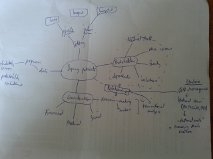Post in response to #H817open MOOC activity 7: Resolving Open Educational Resource Issues
Learner support
I found very little evidence of thinking or activity in this area. That which I did find (Wilson & McAndrew, 2009), was from the viewpoint of the educator as opposed to the learner. This (self-acknowledged) limited study asked a sample of HE educators how they would use OpenLearn to support their own learners. One key area, was in supporting learners with specific study skill needs: it looks as if the skills in OpenLearn in these areas (including maths) are generic enough to be relevant at HE institutions across in different countries. An overriding theme was that the easiest way for the OERs to be used was as suggested supplementary activities to the students existing course, as opposed to integration with it. More specifically, remedial work was suggested as another activity, again maths being mentioned.
Areas that were highlighted by the respondents as potentially needing further work to make the OpenLearn OERs useable for learners in other institutions included:
- Materials in languages other than English
- OpenLearn OERs beinge too long, and too text based, with suggestions for slimming these down into smaller units for their learners’ consumption
In addition, it was felt that time pressure on HE educators was a key reason for lack of exploration for the potential use of the OERs
Quality, validation and recognition of OERs
Hylen (2007) states the rapid growth of OERs has made finding relevant and quality ones an issue. A lot of OERs are effectively ‘invisible’. Technical solutions, such as attaching meta-data to objects are both time-consuming and fallible. Hylen cites the The European Schoonet study, which suggested that the classification of resources was not accurate in terms of how the resources were actually used. One approach to overcome this (including by European Schoolnet) has been the use of ‘folksonomies’ – getting users to add their own meta-data when using them.
In terms of finding ‘quality resources’, one issue is that quality is determined by the context in which a resource is used; it is not abstract. Connexions is a repository that allows users to rate resources, while also showing the actual contextual use of that resource.
Other strategies to afford resources with quality are:
- EFQUEL (European Foundation for Quality in e-Learning): a four step framework/roadmap for all stakeholders in e-learning
- Open Peer Review – time consuming and expensive
- Brand Attachment – think OpenLearn. Also attaches brand risk!
Intellectual property rights
Downes (2002), noted that a major expense facing the MIT OpenCourseWare project was in clearing the licenses for all the material that was used. The issues to be contended with include:
- Can authors request that their materials is removed from sites?
- Can material be updated or amended only upon author approval?
- Can content be used by for-profit institutions?
Different licenses have evolved to meet these needs. An example of which are the Creative Commons licenses, that allow for a range of permissions to be associated with each OER, such as limits on commercial useage, modification, and giving author credit for use. http://creativecommons.org/licenses/
